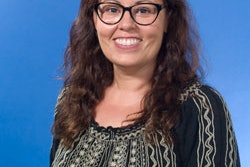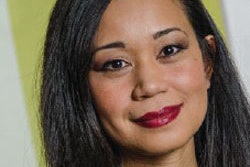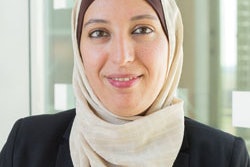Poverty isn’t some abstract idea to Dr. Desireé Vega. She’s experienced it firsthand. Growing up in Brooklyn and Queens as one of three Puerto Rican children, Vega and her parents were oft en transient, moving from place to place in an effort to make financial ends meet College wasn’t readily considered an option either, until her high school math teacher and track coach, Tim Connor, encouraged her to apply.
“I knew I needed to get away from the struggle so that I could be successful,” says Vega, who enrolled at Binghamton University, several hours north of New York City. “School was the way out from me; from the struggle and generational poverty I witnessed in my family.”
Initially, Vega thought that she wanted to be an accountant. But that career aspiration was short-lived.
“During my first semester, I took a microeconomics course and, after not doing well, I quickly realized this was not how I wanted to spend the next four years,” she says, adding that she eventually found her passion in a psychology course.
Her involvement in campus life was enhanced by her work at an autism and learning disabilities clinic. It was through this work that she began thinking about her career trajectory.
“I really wanted to work with this type of at-risk population,” says Vega, whose involvement with the Ronald E. McNair Post-baccalaureate Achievement Program ensured that she would go on to pursue a graduate degree.
She began researching graduate programs, but The Ohio State University (OSU)’s school psychology program caught her attention, though she had never ventured to the Buckeye state before.
The program’s rigorous focus on research and its urban focus “drew me to the program,” she says.
Because OSU required all of their applicants to the school psychology program to interview on campus, Vega took her last $200, purchased a Greyhound bus ticket, and made the 14-hour trek from Binghamton to Columbus, Ohio.
Not only was she admitted into the graduate program, where she earned a master’s in 2008 and a Ph.D. in 2011, her assistantship subsidized her educational costs.
During her final year in the doctoral program, she moved to Omaha, Nebraska, where she worked as a school psychologist as part of her internship.
But after she was licensed, Vega stayed on for a total of three years, working with special education students and providing evaluations and consultations for students with academic and behavioral problems. As a bilingual school psychologist, she also began to work with the refugee and Latina/o populations throughout Omaha.
By 2013, Vega was hired as an assistant professor of school psychology at Texas State University, working with specialistlevel graduate students. She also honed her research skills and quickly became an expert on the assessment of English language learners and the impact disproportionate placement in special education has on minority students.
Eager to work with doctoral students, Vega made the transition to the University of Arizona earlier this year.
“Dr. Desireé Vega has a deep commitment to Latino and African-American students. In a short period of time, she has amassed numerous publications focusing on these groups,” says Dr. James L. Moore III, EHE Distinguished Professor of Urban Education and Executive Director of the Todd Anthony Bell National Resource Center on the African American Male at OSU and cochair of Vega’s dissertation committee.
“For nearly 10 years, I have been afforded the unique opportunity to work closely with Dr. Vega as one of her mentors. From my perspective, she is poised to become one of the most significant Latina educational researchers in the United States. Her scholarship has immense appeal to both education and non-education audiences.”
Title: Assistant Professor, School Psychology, University of Arizona
Tenured: No
Education: B.A., Binghamton University; Ph.D., M.A., The Ohio State University
Age: 32
Career mentors: Dr. James L. Moore III., The Ohio State University
Words of wisdom/advice for new faculty members: I would say not to be afraid to say “no” to service requests. As tenure-track faculty, most of our time should be spent on research and teaching, yet service can easily consume our time. Be realistic about what you can and cannot do and say no to these requests when it is not feasible!















